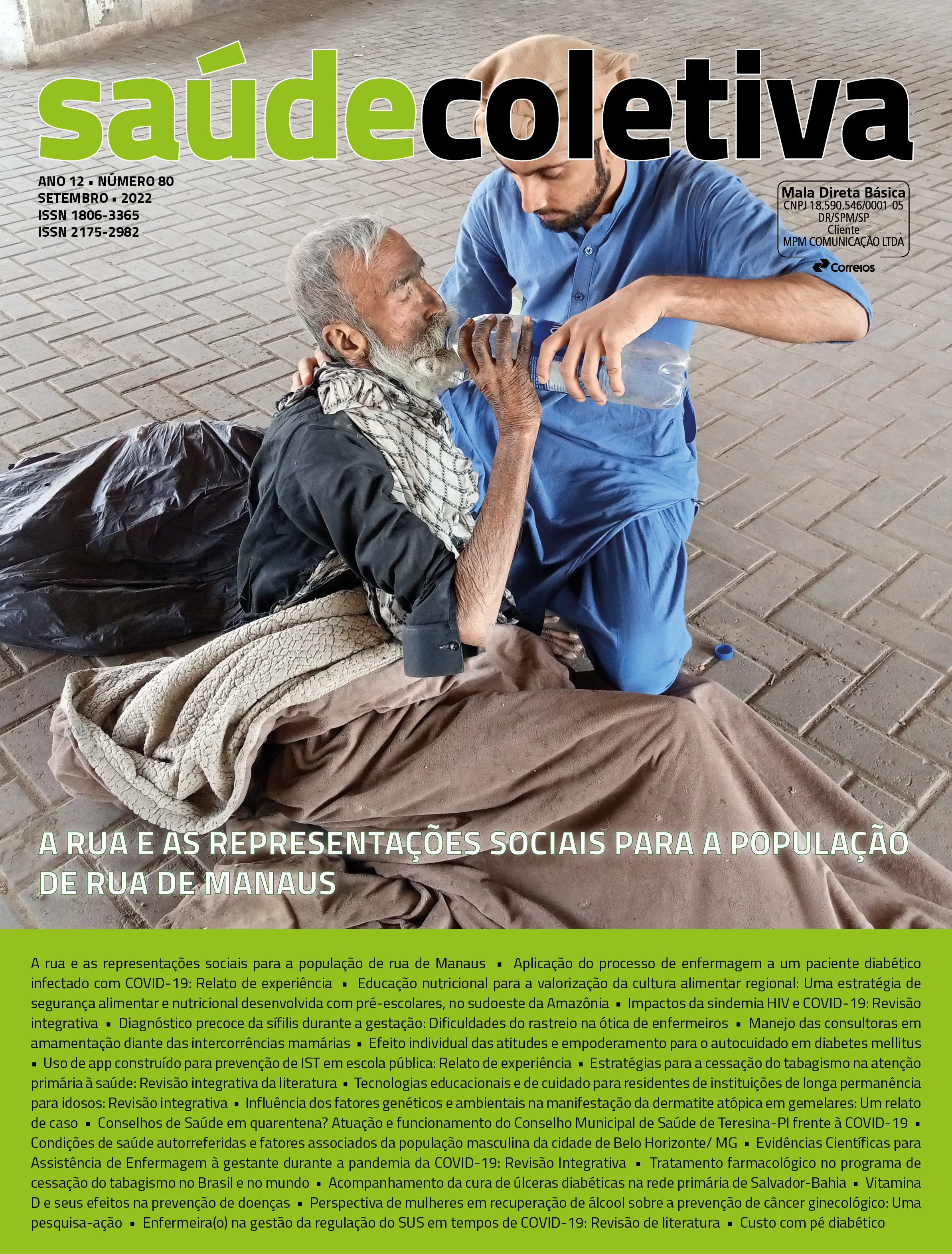Application of the nursing process to a diabetic patient infected by COVID-19: Experience report
DOI:
https://doi.org/10.36489/saudecoletiva.2022v12i80p11238-11247Keywords:
Covid-19, Diabetes, Group of risk, ElderlyAbstract
In December 2019, after cases recorded in Wuhan, China, a new type of coronavirus was discovered, SARS-CoV-2, which causes the disease Coronavirus Disease 2019 (Covid-19). International reports have revealed a high predisposition of elderly patients or patients with existing comorbidities to admission to intensive care units due to complications. In view of this, studies have been trying to highlight the clinical profiles most susceptible to developing the severe course of Covid-19, pointing out Diabetes Mellitus as a potential risk. In view of the above, the professional nurse stands out, since he is in the front line and of all the professionals who perform the care, nursing is the area that has the most contact with the patient. Thus, this academic work aims to describe the application of the Nursing Process to an elderly and type 2 diabetic patient infected with Covid-19 and to discuss, according to the literature, the main findings. Descriptive study, of the experience report type. A virtual interview was carried out through Google Meets, in the municipality of Crateús, in September, with a target patient, classified as a Risk Group. Being questioned about the involvement of the disease, symptoms, complications, treatment and sequelae and then applied the Nursing Process. Patient D.M.M. 72 years old, female compensated type 2 diabetic, infected with COVID-19 in June 2020. She reported that at the beginning of symptoms she felt fever and headache for 2 days, then arthralgia, unable to walk, with visible edema in her lower limbs (even after improvement of the main symptoms), diarrhea and dyspnea. She felt an improvement in her condition after a month, on complete rest. She claimed not to have anosmia and preserved palate. Her condition was worsened due to pulmonary involvement, in 50% and saturation in 90%. She underwent indicated treatment at a health center and evolved positively. Despite the good response obtained in the patient, research says that there is still no specific, adequate and totally reliable treatment. The Nursing Process was carried out, with care based on the patient's identified diagnoses, with an emphasis on implementing self-care incentives based on the patient's reality. Thus, the nursing process stands out as an indispensable tool for the care of the elderly patient. Being able to predict potential risks for future complications of the body, which can be prevented with the implementation of nursing care. Regarding the Covid-19 disease, the fact of not knowing the real harms generated in the infected organisms is something to be asked, and despite every effort to achieve applicable results, the scientific community points out many uncertainties regarding the prognosis of this disease. disease, being uncertain and with deviations from the pattern of involvement.
References
Conselho Internacional de Enfermagem. Classificação Internacional para a Prática de Enfermagem: CIPE®. Versão 2019/2020. 2019; 1-182
DANTAS, Tays Pires et al. Diagnósticos de enfermagem para pacientes com COVID-19. Journal Health NPEPS. 2020 jan-jun; 5(1):396-416.
Diagnósticos de enfermagem da NANDA-I: definições e classificação 2018-2020 [recurso eletrônico] / [NANDA International]; tradução: Regina Machado Garcez; revisão técnica: Alba Lucia Bottura Leite de Barros... [et al.]. – 11. ed. – Porto Alegre: Artmed, Editado como livro impresso em 2018.
FALAVIGNA M. et al. Diretrizes para o tratamento farmacológico da COVID-19. Consenso da Associação de Medicina Intensiva Brasileira, da Sociedade Brasileira de Infectologia e da Sociedade Brasileira de Pneumologia e Tisiologia. Rev Bras Ter Intensiva. 32(2):166-196, 2020.
Federação Internacional de Diabetes. Atlas de Diabete da IDF, 9ª edn. [Internet]. Bruxelas, Bélgica, 2019 [acesso em 03/11/2020]. Disponível em: https://diabetesatlas.org/
FERREIRA, L.T. et al. Diabetes melito: hiperglicemia crônica e suas complicações. Arquivos Brasileiros de Ciências da Saúde, v.36, n. 3, p. 182-8, Set/Dez 2011
LIMA, Alessandra; VIEIRA, Luciana. “KIT COVID”. Núcleo de Evidências. Secretaria de Estado da Saúde. Goiás. 10/julho, 2020. Disponível em: http://docs.bvsalud.org/biblioref/2020/08/1116448/kit-covid-19.pdf
MACHADO et al. Mecanismos de resposta imune às infecções. Educação Médica Continuada. An bras Dermatol, Rio de Janeiro, 79(6):647-664, nov/dez. 2004
Ministério da Saúde (BR). O que é coronavírus?. [Internet]. Brasília: Ministério da Saúde; 2020 [acesso em 03/11/2020]. Disponível em: https://www.saude.gov.br/o ministro/746-saude-de-a-a-z/46490- novo-coronavirus-o-que-e-causassintomas-tratamento-e-prevencao.
SILVA, Alex dos Santos et al. Manifestações Clínicas E Laboratoriais Da Covid-19 Em Pessoas Com Diabetes: Revisão Integrativa. Revista Enfermagem Atual In Derme. Edição Especial Covid-19 – 2020.







